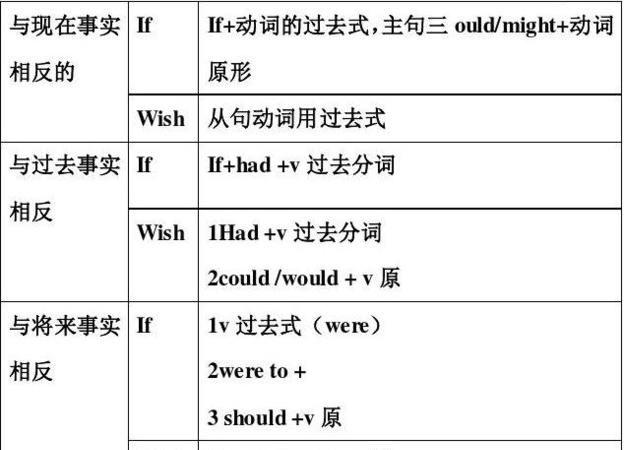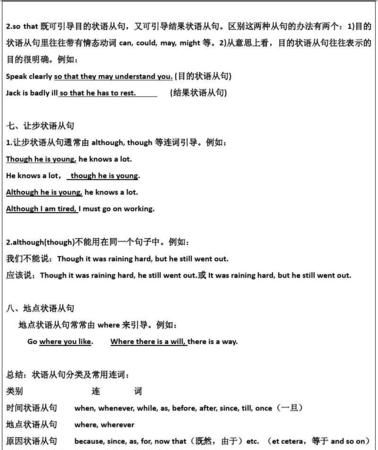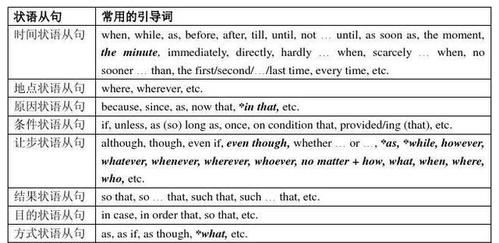本文目录
原因状语从句的引导词
时间状语引导词:when, while, as, before, after, since, until/till, once, every time, whenever, no nooer…than…, hardly/scarcely…when…, as soon as, the moment, directly, immediately….
地点状语引导词:where, wherever, everywhere, anywhere…
原因状语从句引导词: because, as, since, for, now that, seeing (that), considering (that), in that…
目的状语从句引导词:so that, in order that, in case, for fear that, lest…
结果状语从句引导词:so, so that, so…that…, such…that….
让步状语从句引导词:although/though, even if/though, as, while, whether…or…;
whatever, whoever, whenever, wherever, however, no matter what/who/when/where/how…
条件状语从句引导词:if, unless, as/so long as, in case, only if, if only, on condition that, provided /providing (that), suppose/supposing (that)
方式状语从句引导词:as, as though/if, the way
比较状语从句引导词:than, as…as…, not as/so…as, the +比较级,the +比较级

九种状语从句的常用引导词都有哪些?
一般情况下,时间和条件状语从句的谓语动词一般用“一般现在时”表示“一般将来时”,用“现在完成时”表示“将来完成时”。例如:
I will call you as soon as I arrive in Beijing. 我一到北京就给你打电话。(这是由as soon as引导的时间状语从句,从句中的谓语动词arrive是一般现在时,表示一般将来时,决不可用will arrive)
As soon as I have finished this work, I will go home. 我一完成此工作,就回家。(从句中的谓语动词用现在完成时have finished,表示将来完成时,决不可用will have finished)
If he comes back, please let me know.如果他回来了,请通知我。(从句中的谓语动词用comes back,表示一般将来时,决不可用will come back)
状语从句讲解和练习
状语修饰动词、形容词、副词或整个句子。通常由副词、介词短语、动词不定式、分词和从句等担当。例如:
1. Naturally , our grandparents were pleased to get our phone call . (副词)
2. We worked hard , from sunrise to sunset . (介词状短语)
3. To help my disabled aunt , I spend an hour working in her house every day . (不定式)
4. Seen from a distance , the farmhouse looked deserted . (过去分词)
5. I know how to light a camp fire because I had done it before .(原因状语从句)
状语的位置比较灵活,可以位于句首、句末或句中。enough用作状语修饰形容词和副词时必须后置。
状语从句主要用来修饰主句或主句的谓语。一般可分为九大类,分别表示时间、地点、原因、目的、结果、条件、让步、比较和方式。尽管种类较多,但由于状语从句与汉语结构和用法相似,所以理解和掌握它并不难。状语从句的关键是要掌握引导不同状语从句的常用连接词
和特殊的连接词即考点。现分别列举如下:
1. 时间状语从句
常用引导词:when, as, while, as soon as, before, after, since , till, until
特殊引导词:the minute, the moment, the second, every time, the day,the instant, immediately , directly, no sooner … than, hardly …when, scarcely … when
I didn’t realize how special my mother was until I became an adult.
While John was watching TV, his wife was cooking.
The children ran away from the orchard(果园), the moment they saw the guard.
No sooner had I arrived home ,then it began to rain.
Every time I listen to your advice, I get into trouble.
2. 地点状语从句
常用引导词:where
特殊引导词:wherever, anywhere, everywhere
Generally, air will be heavily polluted where there are factories.
Wherever you go, you should work hard.
3. 原因状语从句
常用引导词:because, since, as, for
特殊引导词:seeing that, now that, in that, considering that, given that.
My friends dislike me because I’m handsome and successful.
Now that everybody has come, let’s begin our conference.
The higher income tax is harmful in that it may discourage people from trying to earn more.
Considering that he is no more than 12 years old, his height of 1.80 m is quite remarkable.
4. 目的状语从句
常用引导词:so that, in order that
特殊引导词:lest, in case, for fear that,in the hope that, for the purpose that, to the end that
The boss asked the secretary to hurry up with the letters so that he could sign them.
The teacher raised his voice on purpose that the students in the back could hear more clearly.
5. 结果状语从句
常用引导词:so … that, such … that,
特殊引导词:such that, to the degree that, to the extent that, to such a degree that,
He got up so early that he caught the first bus.
It’s such a good chance that we must not miss it.
To such an degree was he excited that he couldn’t sleep last night.
6. 条件状语从句
常用引导词:if, unless,
特殊引导词:as/so long as, only if, providing/provided that, supposing that, in case that, on condition that
We’ll start our project if the president agrees.
You will certainly succeed so long as you keep on trying.
Provided that there is no opposition, we shall hold the meeting here.
7. 让步状语从句
常用引导词:though, although, even if, even though
特殊引导词: as(用在让步状语从句中必须要倒装),while ( 一般用在句首 ),no matter …, in spite of the fact that, while, whatever, whoever, wherever, whenever, however, whichever
Much as I respect him, I can’t agree to his proposal.
尽管我很尊敬他, 我却不同意他的建议。
The old man always enjoys swimming even though the weather is rough.
No matter how hard he tried, she could not change her mind.
He won’t listen whatever you may say.
8. 比较状语从句
常用引导词:as(同级比较), than(不同程度的比较)
特殊引导词:the more … the more … ; just as …, so…; A is to B what /as X is to Y; no … more than; not A so much as B
She is as bad-tempered as her mother.
The house is three times as big as ours.
The more you exercise, the healthier you will be.
Food is to men what oil is to machine. 食物之于人,犹如油之于机器。
9. 方式状语从句
常用引导词:as, as if, how
特殊引导词:the way
When in Rome, do as the Roman do.
She behaved as if she were the boss.
Sometimes we teach our children the way our parents have taught us.

九大状语从句有哪些先行词,连接词定义
1、时间状语从句。
2、地点状语从句。
3、原因状语从句。
4、条件状语从句。
5、目的状语从句。
6、让步状语从句。
7、比较状语从句。
8、方式状语从句。
9、结果状语从句。
状语从句中的从句可以修饰谓语、非谓语动词、定语、状语或整个句子。根据其作用可分为时间、地点、原因、条件、目的、结果、让步、方式和比较等从句。
状语从句一般由连词(从属连词)引导,也可以由词组引起。从句位于句首或句中时通常用逗号与主句隔开,位于句尾时可以不用逗号隔开。

扩展资料
一般情况下,时间和条件状语从句的谓语动词一般用“一般现在时”表示“一般将来时”,用“现在完成时”表示“将来完成时”。例如:
1、I will call you as soon as I arrive in Beijing. 我到北京就将给你打电话。
(这是由as soon as引导的时间状语从句,从句中的谓语动词arrive是一般现在时,表示一般将来时,绝不可用will arrive)
2、As soon as I have finished this work, I will have gone home.如果我早点完成工作的话,我现在已经到家了。
(从句中的谓语动词用现在完成时have finished,表示将来完成时,绝不可用will have finished)
3、If he comes back, please let me know.如果他回来了,请通知我。
(从句中的谓语动词用comes back,表示一般将来时,绝不可用will come back)
从句通常结构:主 do sth.do sb.(条件)+ V.结果。
参考资料来源:百度百科-状语从句
状语从句的引导词有哪些
1.表示目的状语的从句可以由that, so that, in order that, lest, for fear that, in case等词引导,例如:
You must speak louder so that /in order that you can be heard by all.
He wrote the name down for fear that(lest) he should forget it.
Better take more clothes in case the weather is cold.
2.原因状语从句
比较:because, since, as和for
1) because语势最强,用来说明人所不知的原因,回答why提出的问题。当原因是显而易见的或已为人们所知,就用as或 since。
I didn't go, because I was afraid.
Since /As the weather is so bad, we have to delay our journey.
2) 由because引导的从句如果放在句末,且前面有逗 号,则可以用for来代替。但如果不是说明直接原因,而是多种情况加以推断,就只能用for。
He is absent today, because / for he is ill.
He must be ill, for he is absent today.
3.让步状语从句
though, although
注意: 当有though, although时,后面的从句不能有but,但是 though 和yet可连用
Although it's raining, they are still working in the field.
虽然在下雨,但他们仍在地里干活。
He is very old, but he still works very hard.
虽然他很老,但仍然努力地工作。
Though the sore be healed, yet a scar may remain.
伤口虽愈合,但伤疤留下了。 (谚语)
4.
地点状语从句通常由where, wherever 引导。
Where I live there are plenty of trees.
我住的地方树很多。
Wherever I am I will be thinking of you.
不管我在哪里我都会想到你。
5.
方式状语从句
方式状语从句通常由as, (just) as…so…, as if, as though引导。
1) as, (just) as…so…引导的方式状语从句通常位于主句后,但在(just) as…so…结构中位于句首,这时as从句带有比喻的含义,意思是"正如…","就像",多用于正式文体,例如:
Always do to the others as you would be done by.
你希望人家怎样待你,你就要怎样待人。
As water is to fish, so air is to man.
我们离不开空气,犹如鱼儿离不开水。
Just as we sweep our rooms, so we should sweep backward ideas from our minds.
正如打扫房屋一样,我们也要扫除我们头脑中落后的东西。
2) as if, as though
两者的意义和用法相同,引出的状语从句谓语多用虚拟语气,表示与事实相反,有时也用陈述语气,表示所说情况是事实或实现的可能性较大。汉译常作"仿佛……似的","好像……似的",例如:
They completely ignore these facts as if (as though) they never existed.
他们完全忽略了这些事实,就仿佛它不存在似的。(与事实相反,谓语用虚拟语气。)
He looks as if (as though) he had been hit by lighting.
他那样子就像被雷击了似的。(与事实相反,谓语用虚拟语气。)
It looks as if the weather may pick up very soon.
看来天气很快就会好起来。(实现的可能性较大,谓语用陈述语气。)
说明:as if / as though也可以引导一个分词短语、不定式短语或无动词短语,例如:
He stared at me as if seeing me for first time.
他目不转睛地看着我,就像第一次看见我似的。
He cleared his throat as if to say something.
他清了清嗓子,像要说什么似的。
The waves dashed on the rocks as if in anger.
波涛冲击着岩石,好像很愤怒。
6.
结果状语从句
结果状语从句常由so… that 或 such…that引导,掌握这两个句型,首先要了解so 和 such与其后的词的搭配规律。
比较:so和 such
其规律由so与such的不同词性决定。such 是形容词,修饰名词或名词词组,so 是副词,只能修饰形容词或副词。 so 还可与表示数量的形容词many, few, much, little连用,形成固定搭配。
7.条件状语从句
连接词主要有 if, unless, as/so long as, on condition that 等。.
if 引导的条件句有真实条件句和非真实条件句两种。非真实条件句已在虚拟语气中阐述。
unless = if not.
Let's go out for a walk unless you are too tired.
If you are not too tied, let's go out for a walk.
就这些了吧。

以上就是关于九大状语从句引导词 ,原因状语从句的引导词的全部内容,以及九大状语从句引导词 的相关内容,希望能够帮到您。

